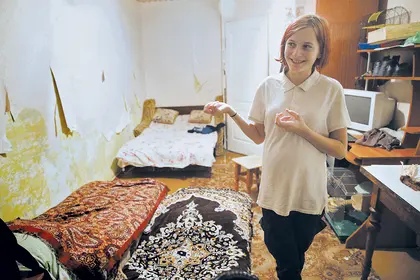Anastasia Naumenko will be a mother by the end of February.
Naumenko is only 13 years old, and has not even finished the eighth grade. She only found out she was expecting a child six months into her pregnancy.
“My mother began to suspect something, my stomach was getting bigger, and I started eating a lot,” Naumenko told the Kyiv Post. “At first I cried. Mom said she would kill me, but then she accepted my pregnancy. I planned to have kids only when I was 23–24 years old, after I get education.”
According to the United Nations Population Fund, Naumenko’s case is not that rare: Every day, all over the world 20,000 teenage girls give birth; annually more than seven million. While in developed countries, like the Netherlands, Germany, Norway and Sweden, the adolescent birth rate per 1,000 women aged 15 to 19 is five.
In Ukraine it’s 27, or five times higher.
In the post-Soviet states, one reason for the high rate is lack of sex education: Early sex education, rare in Ukraine’s schools, helps delay children’s first sexual experiences and significantly reduces sexually transmitted diseases and pregnancies.
Family trouble
There are six children in the Naumenko family. Anastasia is the oldest. She and her brothers and sisters have spent some time in an orphanage because of their mother’s alcohol problems. Now they live together.
“My mother and I often quarreled when she was addicted to alcohol. I could leave home for a few weeks or months,” Naumenko says. “At that time we had a fight again and I went to spend a night at my friends’ brother’s place. Then, as well as now, I was very naïve. I don’t remember anything. He was drinking alcohol with friends, and I was drinking juice. Maybe he spiked my drink.”
She hardly talks about her child’s father, only that his name is Dima, he is 23 and he is “not a very good person. I try not to bear a grudge against people. I’ll forget it as a terrible dream,” she says.

One generation to nextNaumenko was born when her mother was 15 and had sex for the first time when she was 12. Her partner was 14, they were together for six months and then he started to abuse and humiliate her, so they broke up.
Despite her pregnancy, she says she actually knew about contraception from an early age.
“The current generation knows about it at the age of 7. It’s always discussed among friends. They told me about that. When I was 6 years old I already knew that I need to protect myself,” she says.
School education
Ukrainian school students are supposed to receive basic sex education within the framework of the “Health Protection” and “Anatomy” national curriculum courses. However, according to U-Report, a free online messaging platform run by The United Nations Children’s Fund for young people, only 42 percent of Ukrainian teenagers actually take the courses, which are also poorly designed. Some schools invite in lecturers to teach independent sex education courses.
The vice director for educational work at Kyiv Gymnasium No. 179, Svitlana Bogdan, calls the issue of sex education “a painful question, that’s why the more we inform children in more different forms, the better.”
“Such information can’t be a luxury for teenagers,” said Bogdan, who invited tutors from “The Hidden Side of Love” course to give classes to her students.
“The Hidden Side of Love” was created using charity funds and is designed to prevent violence during adolescents’ first relationships.
Over the three-month course, students attend 12 classes, where they are taught the basics of female and male psychology, the creation of harmonious sexual relations, self-development, and the protection of personal boundaries. The most common stereotypes that can influence the teenagers’ perception of relationships are analyzed during a lecture called “Sex and Love Myths:” For example, that friendship between a man and a woman does not exist, or that if a man hits a woman it means he loves her.
Alexandra Starobor, head of “The Hidden Side of Love,” says that understanding happy relationships and happiness itself does not unfortunately form when people become adults, but much earlier, “in adolescence, when we are forming as individuals.”
Daniil Stolbunov, an activist for the non-government organization Teenergizer, which works with young people, believes the post-Soviet mentality is the reason why “parents and teachers don’t talk with children about sex at all, or raise this issue when it’s too late.”
“Teenagers know how to divide, but do not know how to use a condom,” Daniil says.
Naumenko plans to go back to school after six-months of maternity and finish it. She says she’s thinking about becoming a cook, but this isn’t the main thing on her mind.
“I’m not thinking about a future profession,” the girl says. “Now I’m thinking how to bring up a child.”
Editor’s Note: This article is a part of the “Journalism of Tolerance” project by the Kyiv Post and its affiliated non-profit organization, the Media Development Foundation. The project covers challenges faced by sexual, ethnic and other minorities in Ukraine, as well as people with physical disabilities and those living in poverty. This project is made possible by the support of the American people through the U. S. Agency for International Development and Internews. Content is independent of the donors.
You can also highlight the text and press Ctrl + Enter







Comments (0)